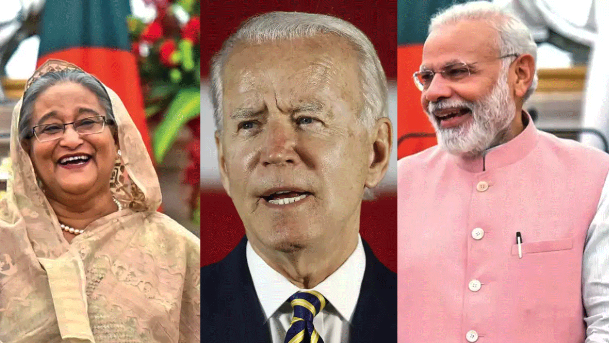India expresses concerns over American involvement in the upcoming Bangladesh Elections
With Bangladesh sharing the longest land border with India, any adverse situation in the country directly affects India’s security and stability.
India has reportedly expressed its dissatisfaction with the United States’ involvement in the upcoming elections in Bangladesh, emphasizing that such actions may destabilize the government led by Prime Minister Sheikh Hasina.
The message from India comes ahead of the G20 Leaders Summit, where both President Joe Biden and Prime Minister Hasina are scheduled to attend. This development holds significance, as India believes that a weak government in Bangladesh could have adverse consequences for regional security and bilateral relations.
India’s Concerns and Perspective
According to unnamed sources cited by Anandabazar Patrika, a Kolkata-based newspaper, India has raised concerns about the potential political concessions to Jamaat-e-Islami, a fundamentalist organization in Bangladesh. New Delhi fears that such concessions could pave the way for fundamentalism to gain a stronghold in Dhaka, endangering the liberal environment that currently exists. India shares the view with Washington that a weak government under Hasina’s leadership would not be in the best interest of either country.
Indian diplomats have reportedly communicated their concerns to the Biden administration at various levels of meetings. The decision to withdraw American troops from Afghanistan and the subsequent power shift to the Taliban have significantly altered the security dynamics in the entire region, including India’s Northeast Frontier region. India perceives the situation as precarious, with the Taliban’s ascendancy in Afghanistan raising concerns about the safety and stability of neighboring countries.
India’s concerns extend beyond Bangladesh, as it believes that America’s policies toward Kabul and other neighboring nations have created discomfort and raised questions about national interests. With Bangladesh sharing the longest land border with India, any adverse situation in the country directly affects India’s security and stability.
India’s Warnings and Consequences
Indian officials have warned the Biden administration that patronizing the growth of Jamaat-e-Islami could lead to increased cross-border terrorism and enhanced Chinese influence in Bangladesh, outcomes that are undesirable for Washington. While the U.S. views Jamaat as an Islamic political organization, India firmly believes that it is controlled by radical fundamentalist groups and Pakistan, rather than representing a moderate stance.
India has also expressed its reservations about the Biden administration’s separate visa policy for Bangladesh, which is seen as a direct interference in the internal politics of Bangladesh. Under this policy, individuals involved in disrupting the upcoming elections will be denied entry to the United States. Indian diplomats argue that this move undermines regional stability and represents an imposition of U.S. laws on another country.
Positive Engagement and Regional Stability
During a recent visit to New Delhi, a delegation from Bangladesh Awami League held meetings with top leaders of India’s Bharatiya Janata Party (BJP) and central government ministers. The delegation conveyed the message that the alliance between Bangladesh Nationalist Party (BNP) and Jamaat-e-Islami poses a threat to regional stability. Agriculture Minister Abdur Razzaque, the leader of the delegation, had a positive meeting with Indian External Affairs Minister S. Jaishankar. Following the meeting, Razzaque stated that the government led by Prime Minister Sheikh Hasina is committed to preventing Bangladesh’s soil from being used for anti-India activities.
India’s warnings regarding the potential consequences of empowering Jamaat-e-Islami and the implications for cross-border terrorism and Chinese influence highlight the importance of maintaining a strong and stable government in Bangladesh. As both India and the United States navigate their bilateral relations and engage with regional dynamics, constructive dialogue and cooperation will be crucial in ensuring peace and stability in South Asia.


